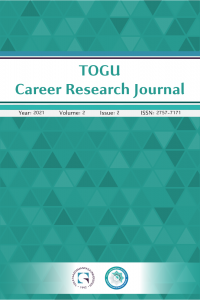Abstract
References
- Akdoğan, A. (2000). Aile işletmelerinin Özellikleri ve Aile işletmelerinde Kurumsallaşma ihtiyaci. Erciyes Üniversitesi İktisadi ve İdari Bilimler Fakültesi Dergisi, (16), 31-47.
- Aytaç, G. (1999). “Türkiye’de edebi çeviri etkinliği”, Yağcı, Ö. (Ed.) (1999), Cumhuriyet dönemi edebiyat çevirileri seçkisi içinde, (pp. 347-349). Ankara: Kültür Bakanlığı.
- Bezirci, K. (2013). “Kurumsallaşma Nedir? Ne Değildir?”. www.marmarasps.com.tr/85af9ba8f4.pdf Date accessed: 27.04.2019.
- Güner, F. (2006). Aile İşletmelerinde İç Denetim, İç Denetimin Faydaları ve Etkin Bir İç Denetim Sistemi Oluşturmanın Yolları, 2. Aile İşletmeleri Kongresi, 14-15 Nisan 2006, İstanbul Kültür Üniversitesi Yayınları, 420-426.
- Gürçağlar, Ş. T. (2005). Kapılar: Çeviri tarihine yaklaşımlar. İstanbul: Scala Yayıncılık.
- Karpuzoğlu, E. (2000). Küçük ve Orta Ölçekli Aile Şirketlerinin Kurumsallaşma Düzeylerinin Belirlenmesine Yönelik Bir Araştırma. Yayınlanmamış, Doktora Tezi, İstanbul Üniversitesi, İstanbul.
- Kayaoğlu, T. (1998). Türkiye'de tercüme müesseseleri. İstanbul: Kitabevi.
- Kök, S. B. (2005). Aile Şirketleri’nde Yeniden Yapılanma Eğilimi ve Kurumsallaşma İhtiyacı. TOBB Ekonomi ve Teknoloji Üniversitesi Orta Anadolu İşletmecilik Kongresi: Kurumsal Yönetim: 41, 54, 24-44.
- Sönmez, A., & Toksoy, A. (2011). Kurumsal yönetim ilkelerinin Türkiye’deki aile işletmelerine uygulanabilirliği. Maliye ve Finans Yazıları, 1(92).
- Translation Studies. (2020, August 23). https://ceviribilim.com/2005/10/13/cogul-dizge-kurami/
- Turkish Language Association. (2020, July 19). http://www.tdk.gov.tr/index.php?option=com_gts&arama=gts&guid=TDK.GTS.5cc41f3a74eee6.44078948
Examination of the Republic Period Translation Office in Terms of Being an Institutional Model for Translation Activities
Abstract
Throughout Turkish history, some organized attempts were made from time to time within the scope of translation activities, and these activities were carried out through state-organized societies, delegations, committees, or offices. Both the initiatives made in the Ottoman period and some translation activities after the proclamation of the Republic were conducted within the framework that we can describe as institutionalization from modern-day perspective, and various translation studies were put forward. It is purposed in this study to examine the Translation Office, one of the institutions established by the managers of the period so as to carry out translation studies in the past, in a multi-dimensional aspect. The Translation Office was observed with its administrative, cultural, economic, political, or ideological dimensions, and it was examined whether the existing structure can be used as an institutional model for translation in the relevant context. In the study, initially, the definition of institutionalization was presented through a general framework and discussed through the above-mentioned dimensions, and some evaluations were conducted on the necessity of institutionalization in translation activities. Then, the organizational structure of the Translation Office was analyzed in terms of the period when it showed its existence. Finally, an answer was sought to the question of whether the obtained data can provide an institutional model in the context of translation. As a result of the analysis, it was concluded that the Translation Office can be a model for institutionalization in translation in terms of management and functioning. However, when evaluated on the basis of the sustainability principle, it was observed that it could not fulfill modern-day institutionalization requirements for various reasons, and it was seen that it did not fully represent as an institutional model for this reason.
Keywords
Translation Office Institutionalization Institutional Translation Institutionalization in Translation
References
- Akdoğan, A. (2000). Aile işletmelerinin Özellikleri ve Aile işletmelerinde Kurumsallaşma ihtiyaci. Erciyes Üniversitesi İktisadi ve İdari Bilimler Fakültesi Dergisi, (16), 31-47.
- Aytaç, G. (1999). “Türkiye’de edebi çeviri etkinliği”, Yağcı, Ö. (Ed.) (1999), Cumhuriyet dönemi edebiyat çevirileri seçkisi içinde, (pp. 347-349). Ankara: Kültür Bakanlığı.
- Bezirci, K. (2013). “Kurumsallaşma Nedir? Ne Değildir?”. www.marmarasps.com.tr/85af9ba8f4.pdf Date accessed: 27.04.2019.
- Güner, F. (2006). Aile İşletmelerinde İç Denetim, İç Denetimin Faydaları ve Etkin Bir İç Denetim Sistemi Oluşturmanın Yolları, 2. Aile İşletmeleri Kongresi, 14-15 Nisan 2006, İstanbul Kültür Üniversitesi Yayınları, 420-426.
- Gürçağlar, Ş. T. (2005). Kapılar: Çeviri tarihine yaklaşımlar. İstanbul: Scala Yayıncılık.
- Karpuzoğlu, E. (2000). Küçük ve Orta Ölçekli Aile Şirketlerinin Kurumsallaşma Düzeylerinin Belirlenmesine Yönelik Bir Araştırma. Yayınlanmamış, Doktora Tezi, İstanbul Üniversitesi, İstanbul.
- Kayaoğlu, T. (1998). Türkiye'de tercüme müesseseleri. İstanbul: Kitabevi.
- Kök, S. B. (2005). Aile Şirketleri’nde Yeniden Yapılanma Eğilimi ve Kurumsallaşma İhtiyacı. TOBB Ekonomi ve Teknoloji Üniversitesi Orta Anadolu İşletmecilik Kongresi: Kurumsal Yönetim: 41, 54, 24-44.
- Sönmez, A., & Toksoy, A. (2011). Kurumsal yönetim ilkelerinin Türkiye’deki aile işletmelerine uygulanabilirliği. Maliye ve Finans Yazıları, 1(92).
- Translation Studies. (2020, August 23). https://ceviribilim.com/2005/10/13/cogul-dizge-kurami/
- Turkish Language Association. (2020, July 19). http://www.tdk.gov.tr/index.php?option=com_gts&arama=gts&guid=TDK.GTS.5cc41f3a74eee6.44078948
Details
| Primary Language | English |
|---|---|
| Journal Section | Research Articles |
| Authors | |
| Publication Date | December 31, 2021 |
| Acceptance Date | December 31, 2021 |
| Published in Issue | Year 2021 Volume: 2 Issue: 2 |


